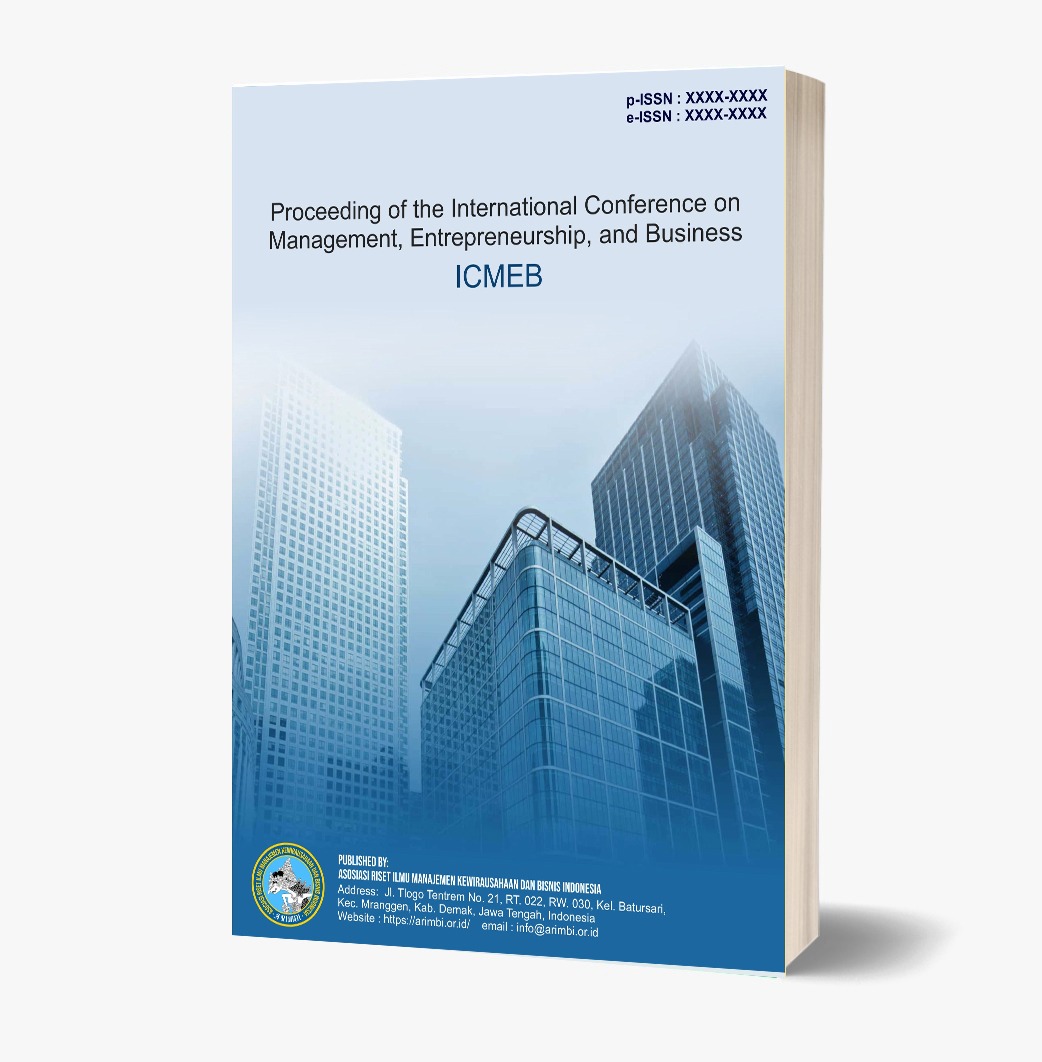The Influence of Tax Understanding, Tax Rates and Tax Sanctions on Taxpayer Compliance in E-Commerce Actors in Luwuk City, Southeast Sulawesi
DOI:
https://doi.org/10.61132/icmeb.v1i1.129Keywords:
Taxpayer Compliance, Tax Rates, Tax Sanctions, E-CommerceAbstract
This study aims to analyze the effect of tax understanding, tax rates, and tax sanctions on taxpayer compliance on e-commerce actors in Luwuk City. The results show that all independent variables, namely tax understanding, tax rates, and tax sanctions, have a positive and significant effect on taxpayer compliance. Tax rates have the most dominant influence with a coefficient of 0.434, followed by tax sanctions of 0.317, and tax understanding of 0.176. This research model has an R-Square value of 0.551, which indicates that 55.1% of the variance in taxpayer compliance can be explained by these three variables. These findings indicate that reasonable tax rates, adequate tax education, and consistent application of sanctions can increase taxpayer compliance in the e-commerce sector.
Downloads
References
Abiola, O. F. A., & Alabi. (2023). Tax compliance and its determinants: A study on small and medium enterprises (SMEs). Deleted Journal. https://doi.org/10.61132/ijema.v1i1.319
Agus, I. T., Grace, A. S., & Hutabarat, M. S. (2023). The influence of tax awareness, tax knowledge, and tax socialization of value-added tax imposition on tax compliance of e-commerce users. Journal of International Conference Proceedings. https://doi.org/10.32535/jicp.v6i5.2644
Ahmad, H. F. (2024). The effect of tax incentives, tax rates and tax sanctions on tax compliance with tax services in the COVID-19 pandemic as a moderation variable. Mizania. https://doi.org/10.47776/mizania.v4i1.890
Ajzen, I. (1991). The theory of planned behavior. Organizational Behavior and Human Decision Processes, 50(2), 179-211.
Alex, M. Y., & Ummah, R. S. (2024). The impact of taxation socialization, taxpayer understanding, service quality, and perception of tax rates on individual taxpayer compliance. Maximum. https://doi.org/10.26714/mki.14.2.2024.151-160
Alexander, S. (2024). Taxing the digital economy. Collection Regional Law Review. https://doi.org/10.56461/iup_rlrc.2024.5.ch16
Asri, A. B. (2024). Impact of tax knowledge, tax rates, tax payment methods, tax sanctions on taxpayer compliance levels micro small and medium enterprises. https://doi.org/10.62207/stfetk37
Becker, G. S. (1968). Crime and punishment: An economic approach. Journal of Political Economy, 76(2), 169-217.
Carolyn, A. (2009). Enforcing pollution control regulation: Strengthening sanctions and improving deterrence.
Chelsea, A., Pontoh, G. T., & Rasyid, S. (2024). The effect of e-filing system implementation, understanding of taxation, and facilitating conditions on taxpayer compliance. https://doi.org/10.59890/ijels.v2i7.2181
Danang, A. P., Nila, A., Pratana, P. M., & Herawansyah, H. (2024). Building a culture of compliance: The influence of tax socialization and inclusion on Indonesian micro, small, and medium enterprises (MSMEs) taxpayers. Open Access Indonesian Journal of Social Sciences. https://doi.org/10.37275/oaijss.v7i6.277
David, M. K. (2008). Deterrence and crime prevention: Reconsidering the prospect of sanctions.
Deasyell, P. K. (2023). The influence of understanding income tax imposition on online trading transactions on marketplace platforms on taxpayer compliance in West Java. Journal of Accounting, Finance, Taxation and Auditing. https://doi.org/10.28932/jafta.v4i2.6770
Dela, A. A., Kusumawardani, A., & Caserio, F. D. (2024). The influence of taxation knowledge, taxpayer awareness, and tax sanctions on individual taxpayer compliance (At the Luwuk Cicadas Primary Tax Office). eCo-Buss. https://doi.org/10.32877/eb.v6i3.1193
Della, F., Quin, A. A., & Isma, A. (2024). Enhancing tax compliance intentions: Analyzing the influence of awareness, attention, and persuasion among future taxpayers. Journal of Economic Education and Entrepreneurship Studies. https://doi.org/10.62794/je3s.v5i1.3280
Duccio, G. d., Rosella, L., & Francesco, M. (2022). Tax avoidance and evasion in a dynamic setting. Journal of Economic Behavior and Organization. https://doi.org/10.1016/j.jebo.2022.10.028
Edi, T., Dian, S. W., & Titi, N. (2024). Driving individual taxpayer compliance: How information technology elevates tax service quality, social engagement and education. https://doi.org/10.62504/jsi938
Endang, M. (2024). Digital tax reform in Indonesia: Perspective on tax policy development. Journal of Infrastructure, Policy and Development. https://doi.org/10.24294/jipd.v8i8.7032
Fathiya, S. N., Dian, Z. S. L., Hikmah, I. Y. H., & Dini, V. (2024). The importance of tax knowledge and public awareness in paying taxes to help economic stability in Indonesia. https://doi.org/10.61132/jieap.v1i2.237
Hansa, P. S. (2022). Fairness dimension of goods and services tax. International Journal of Accounting, Business and Finance. https://doi.org/10.55429/ijabf.v1i1.19
Helwa, S. A., & Farhatun, N. (2024). The influence of tax understanding, taxpayer awareness and tax sanctions on the compliance of e-commerce actors in fulfilling tax obligations. International Journal of Management and Business Economics. https://doi.org/10.58540/ijmebe.v2i3.592
I. N. D., & Murtiani, K. (2022). Optimizing income tax and value-added tax on e-commerce transactions. https://doi.org/10.4108/eai.3-8-2021.2315147
Indira, D. Y., Linda, H. S., & Intan, P. A. (2023). The influence of taxpayer knowledge, taxpayer awareness, information technology on taxpayer compliance of e-commerce users. Bilancia: Scientific Journal of Accounting. https://doi.org/10.35145/bilancia.v7i3.2546
Izzie, H. K., & Nor, H. M. (2021). Service quality, tax awareness and tax fairness as determinants of tax compliance among e-commerce enterprises in Malaysia. The International Journal of Academic Research in Business and Social Sciences. https://doi.org/10.6007/IJARBSS/V11-I2/9190
Selly, P. L., & Suparmin. (2023). The effect of e-filing implementation, understanding of tax regulations and tax sanctions on the level of compliance of individual taxpayers at the Serpong Pratama Tax Service Office. Pundi Journal: Research of Management, Accounting, and Economics. https://doi.org/10.31575/jp.v7i2.498
Shafaa, S. P. A., & Selviani, P. (2024). Factors affecting taxpayer compliance of e-commerce in West Java. International Journal of Humanities Education and Social Sciences. https://doi.org/10.55227/ijhess.v4i1.1117






